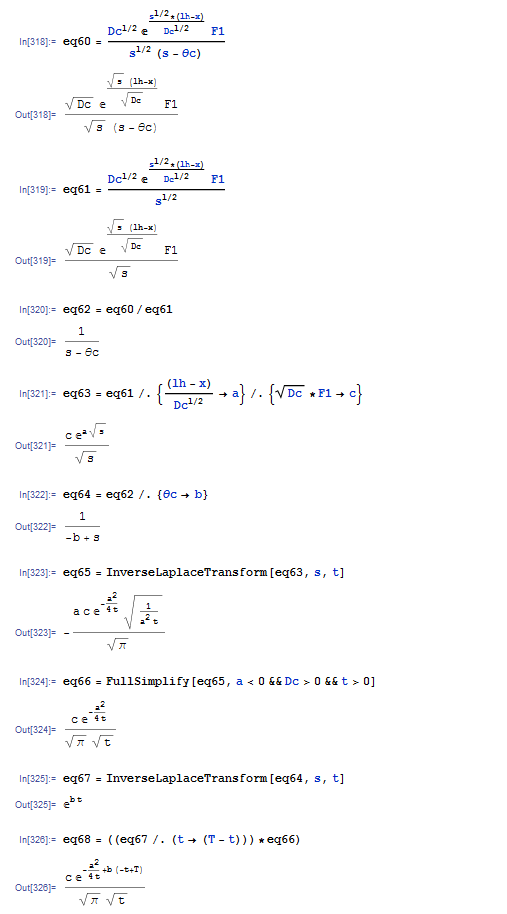Hello, Mr. Iwaniuk,
I can almost realize your method although the final results are a bit different.
There is still another question: the convolution is from negative infinite to positive infinite, but the convolution we used is from zero to t.
Would you like to explain?
Thanks.
eq60 = (Dc^(1/2) E^((s^(1/2)*(lh - x))/Dc^(1/2)) F1)/(
s^(1/2) (s - \[Theta]c))
(Sqrt[Dc] E^((Sqrt[s] (lh - x))/Sqrt[Dc]) F1)/(Sqrt[s] (s - \[Theta]c))
eq61 = (Dc^(1/2) E^((s^(1/2)*(lh - x))/Dc^(1/2)) F1)/s^(1/2)
(Sqrt[Dc] E^((Sqrt[s] (lh - x))/Sqrt[Dc]) F1)/Sqrt[s]
eq62 = eq60/eq61
1/(s - \[Theta]c)
eq63 = eq61 /. {(lh - x)/Dc^(1/2) -> a} /. {Sqrt[Dc]*F1 -> c}
(c E^(a Sqrt[s]))/Sqrt[s]
eq64 = eq62 /. {\[Theta]c -> b}
1/(-b + s)
eq65 = InverseLaplaceTransform[eq63, s, t]
-((a c E^(-(a^2/(4 t))) Sqrt[1/(a^2 t)])/Sqrt[\[Pi]])
eq66 = FullSimplify[eq65, a < 0 && Dc > 0 && t > 0]
(c E^(-(a^2/(4 t))))/(Sqrt[\[Pi]] Sqrt[t])
eq67 = InverseLaplaceTransform[eq64, s, t]
E^(b t)
eq68 = ((eq67 /. (t -> (T - t)))*eq66)
(c E^(-(a^2/(4 t)) + b (-t + T)))/(Sqrt[\[Pi]] Sqrt[t])
eq69 = Integrate[eq68, {t, 0, T}]
ConditionalExpression[
1/(2 Sqrt[b])
c E^(-Sqrt[a^2] Sqrt[b] +
b T) (1 - E^(2 Sqrt[a^2] Sqrt[b]) -
Erf[(Sqrt[a^2] - 2 Sqrt[b] T)/(2 Sqrt[T])] +
E^(2 Sqrt[a^2] Sqrt[b])
Erf[(Sqrt[a^2] + 2 Sqrt[b] T)/(2 Sqrt[T])] -
Erfc[ComplexInfinity] +
E^(2 Sqrt[a^2] Sqrt[b]) Erfc[ComplexInfinity]), Re[a^2] <= 0]

